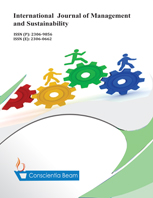Exploring environmental sustainability practices in MSMEs: Insights from Malaysia
DOI:
https://doi.org/10.18488/11.v13i1.3600Abstract
The purpose of this research is to assess the current implementation level of environmental sustainability practices, including green human resource management and green knowledge sharing among Malaysian micro, small, and medium enterprises (MSMEs). The practices investigated are also supported by ways of determining how MSMEs are motivated to implement them and what constraints inhibit such practices. This is a descriptive study, and the MSME (organization) is the unit of analysis, and the owner or manager is the target of the respondent. A total of 300 questionnaires were disseminated to Malaysian MSMEs by using convenient sampling, and the response rate was 48.7%. Overall, the findings reflect the moderate sustainability implementation level of MSMEs. This demonstrates a positive and proactive stance towards environmental sustainability among MSMEs. However, cost reduction and efficiency were reported as the most significant motivators, while lack of support and information from the government as well as social influence were reported as the main constraints. This study provides meaningful insights on pro-environmental practices, green knowledge sharing, and green HRM in improving sustainability practices in MSMEs. MSMEs that voluntarily see sustainability challenges as business opportunities might be ahead of regulations and could draw benefits from this position. The findings also help MSMEs frame their green activities to drive their business capability of creating and retaining greater value in their core business competencies and competitiveness.

